Demolition Contractors West Bridgford
Top Demolition Companies in West Bridgford
Get multiple Demolition Companies quotes for your project today! Compare profiles, reviews, accreditations, portfolio, etc... and choose the best service.
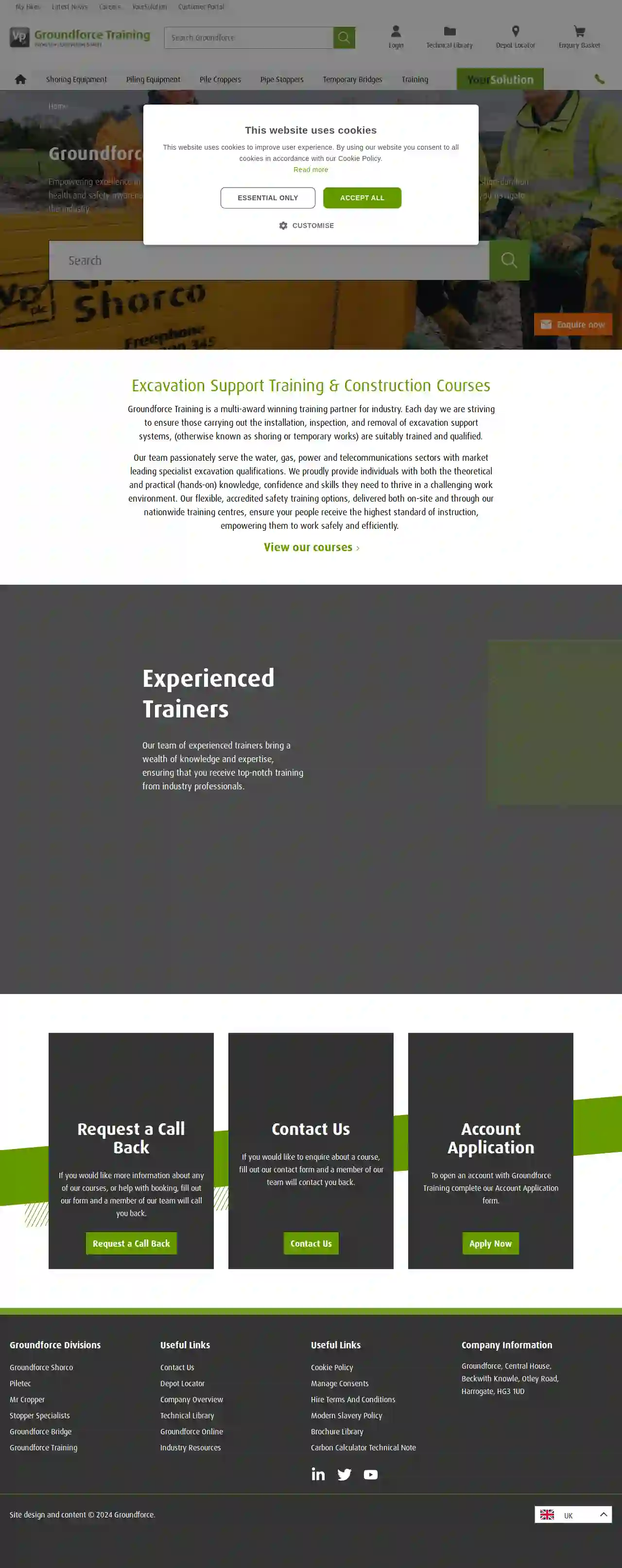
Groundforce Training Services - Excavation Safety
4.9389 reviewsCentral House, Beckwith Knowle, Otley Road, Harrogate, HG3 1UD, GBGroundforce: Your Partner in Safety and Efficiency Groundforce is a leading provider of shoring, piling, and excavation safety solutions. We offer a wide range of products and services to meet the needs of our customers in the construction, infrastructure, and utilities sectors. Our commitment to safety and efficiency is reflected in everything we do, from the design and manufacture of our products to the training we provide to our customers. Our History Groundforce has been in business for over 50 years, and we have a long history of providing innovative and reliable solutions to our customers. We are constantly investing in research and development to ensure that our products and services are at the forefront of the industry. Our Mission Our mission is to provide our customers with the safest and most efficient solutions possible. We are committed to providing our customers with the highest level of service and support. We believe that our customers are our most valuable asset, and we are dedicated to building long-term relationships with them. Our Team Our team is made up of experienced professionals who are passionate about safety and efficiency. We are committed to providing our customers with the best possible experience. We are always available to answer your questions and provide you with the support you need.
- Services
- Why Us?
- Accreditations
- Gallery
Get Quote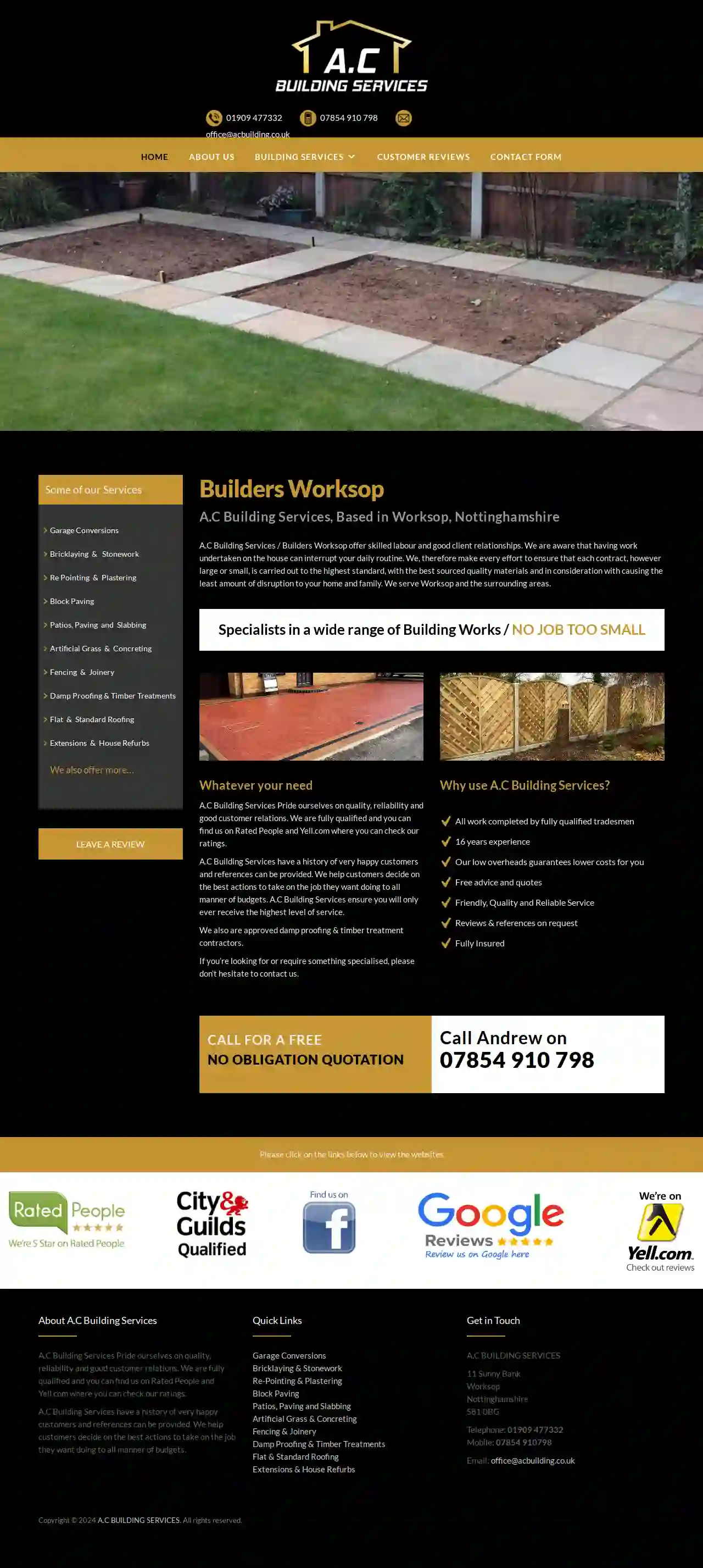
A.C Building Services
520 reviews11 Sunny Bank, Worksop, S81 0BG, GBAbout A.C Building Services A.C Building Services pride ourselves on quality, reliability and good customer relations. We are fully qualified and you can find us on Rated People and Yell.com where you can check our ratings. A.C Building Services have a history of very happy customers and references can be provided. We help customers decide on the best actions to take on the job they want doing to all manner of budgets. We also are approved damp proofing & timber treatment contractors. If you’re looking for or require something specialised, please don’t hesitate to contact us.
- Services
- Why Us?
- Gallery
Get Quote
Arnold Excavation & Hauling, LLC
51 reviewsBatesville, GBArnold Excavation & Hauling, LLC Arnold Excavation & Hauling, LLC offers residential excavation and has been serving the area for over 30 years. Our reputation is built off of relationships with custom local builders, architects, landscape architects, homeowners as well as estate managers. We are a Class A Contractor, committed to providing high-quality excavation services to our clients in Albemarle County and the surrounding Charlottesville Metro Area. Our team is experienced in a wide range of excavation projects, including:
- Services
- Why Us?
- Gallery
Get Quote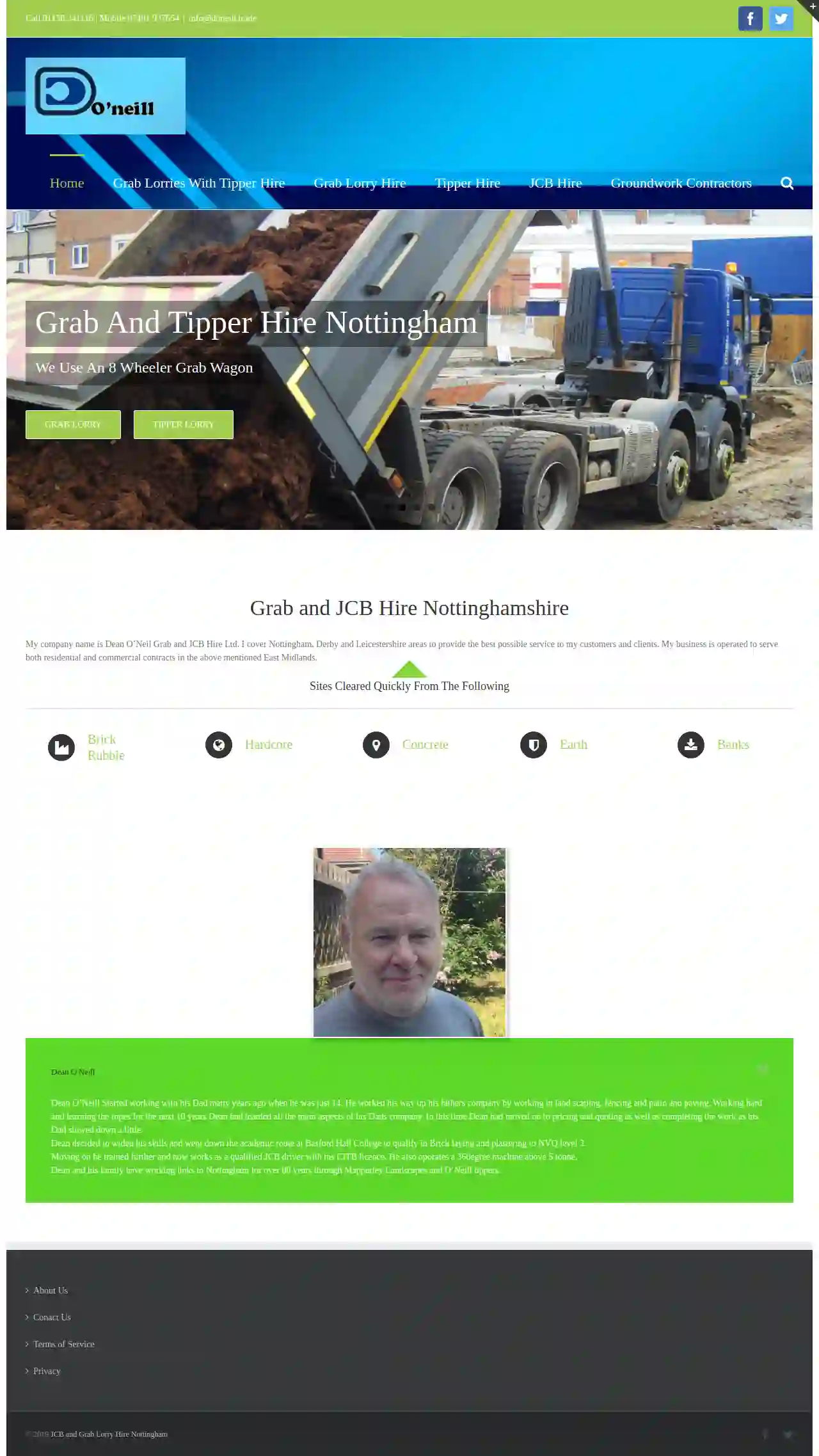
Dean O'Neill Grab and JCB Hire - Nottingham & Mansfield
53 reviewsMansfield, GBAbout Us My company name is Dean O’Neil Grab and JCB Hire Ltd. I cover Nottingham, Derby and Leicestershire areas to provide the best possible service to my customers and clients. My business is operated to serve both residential and commercial contracts in the above mentioned East Midlands. Dean O’Neill Started working with his Dad many years ago when he was just 14. He worked his way up his fathers company by working in land scaping, fencing and patio and paving. Working hard and learning the ropes for the next 10 years Dean had learded all the main aspects of his Dads company. In this time Dean had moved on to pricing and quoting as well as completing the work as his Dad slowed down a little. Dean decided to widen his skills and went down the academic route at Basford Hall College to qualify in Brick laying and plastering to NVQ level 3. Moving on he trained further and now works as a qualified JCB driver with his CITB licence. He also oporates a 360egree machine above 5 tonne. Dean and his family have working links to Nottingham for over 80 years through Mapperley Landscapes and O’Neill tippers.
- Services
- Why Us?
- Our Team
- Gallery
Get Quote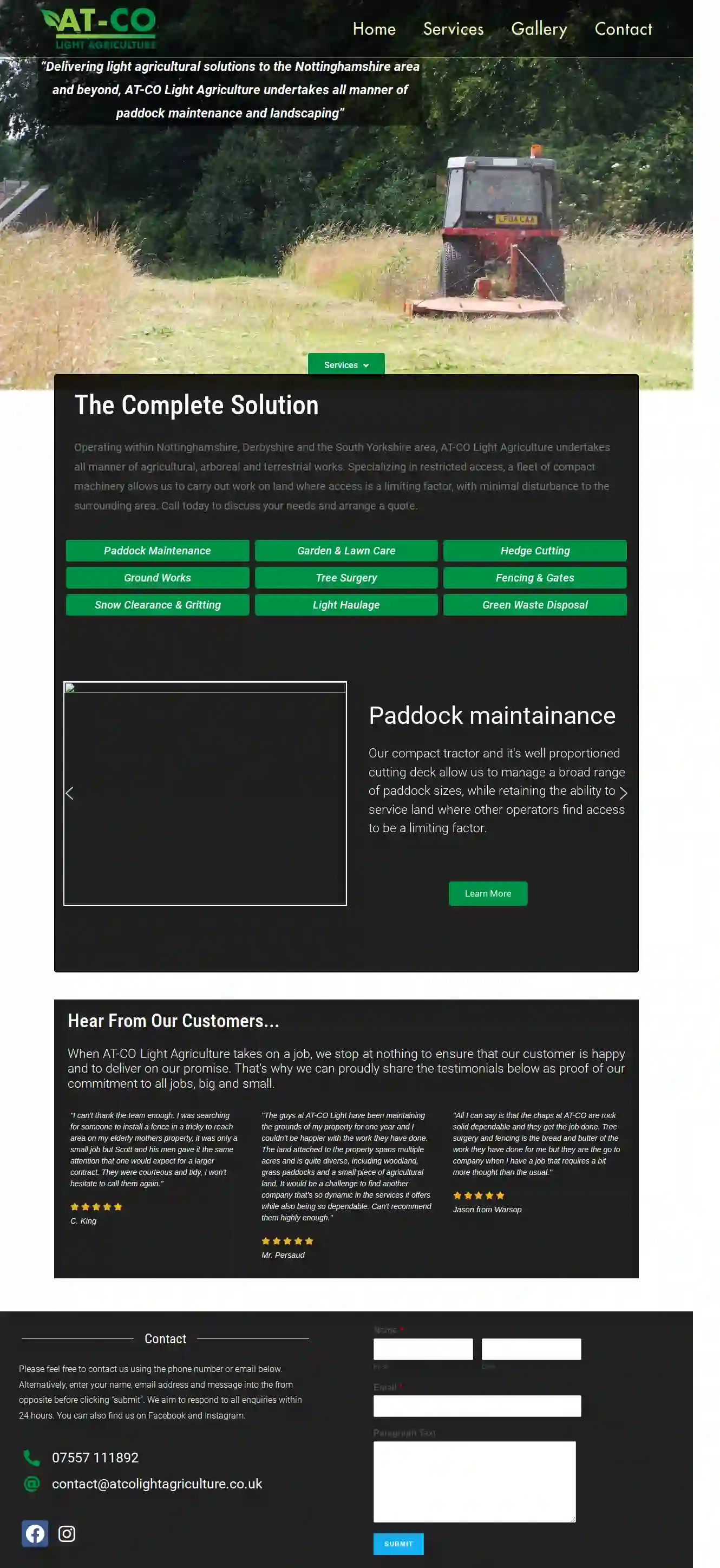
AT-CO Light Agriculture
1Worksop, GBDelivering light agricultural solutions to the Nottinghamshire area and beyond, AT-CO Light Agriculture undertakes all manner of paddock maintenance and landscaping. Operating within Nottinghamshire, Derbyshire and the South Yorkshire area, AT-CO Light Agriculture undertakes all manner of agricultural, arboreal and terrestrial works. Specializing in restricted access, a fleet of compact machinery allows us to carry out work on land where access is a limiting factor, with minimal disturbance to the surrounding area. Call today to discuss your needs and arrange a quote.
- Services
- Why Us?
- Testimonials
- Gallery
Get Quote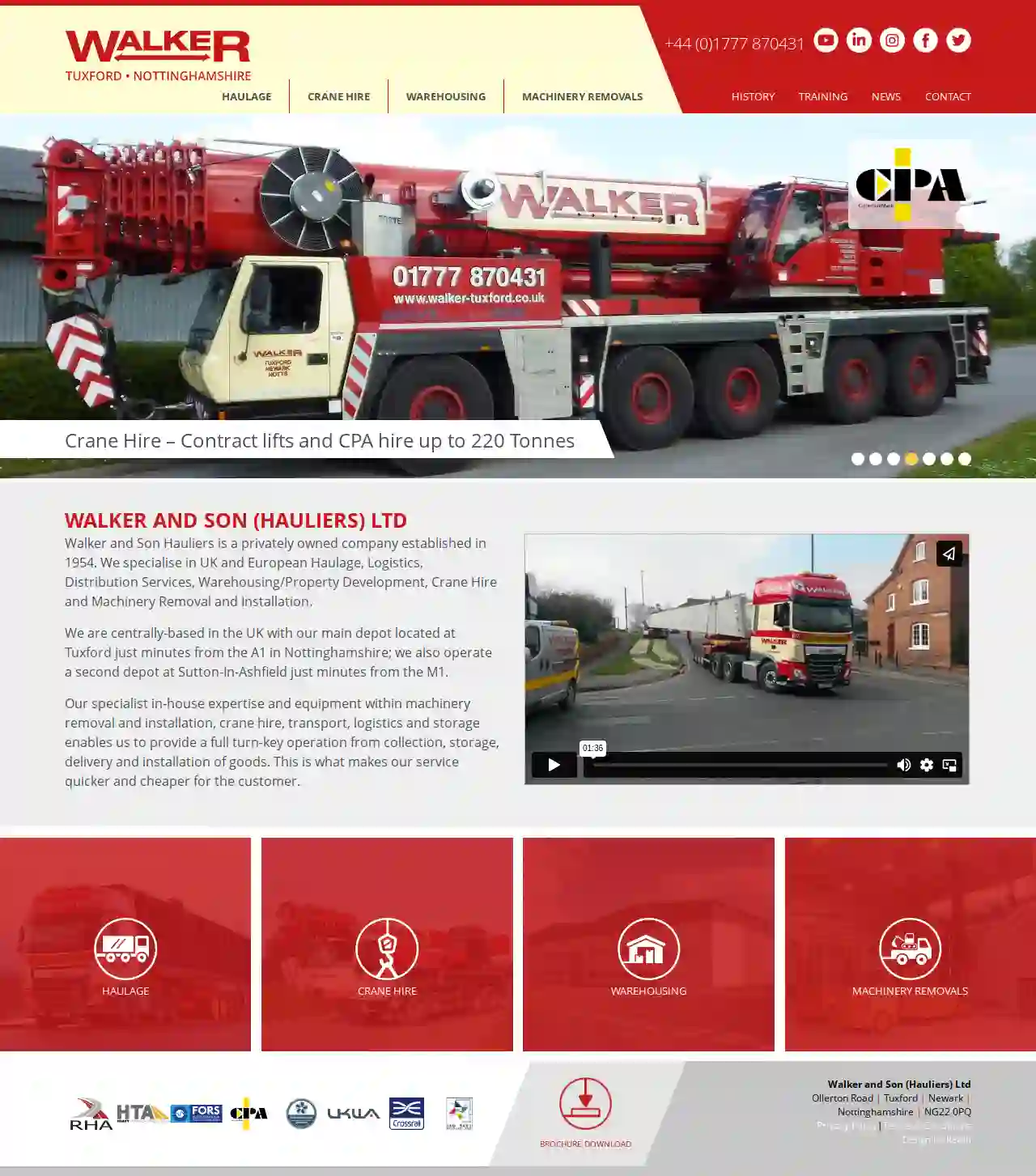
Walker & Son (Hauliers) Ltd
4.68 reviewsOllerton Road, Tuxford, NG22 0PQ, GBWalker and Son (Hauliers) Ltd Walker and Son Hauliers is a privately owned company established in 1954. We specialize in UK and European Haulage, Logistics, Distribution Services, Warehousing/Property Development, Crane Hire and Machinery Removal and Installation. We are centrally-based in the UK with our main depot located at Tuxford just minutes from the A1 in Nottinghamshire; we also operate a second depot at Sutton-In-Ashfield just minutes from the M1. Our specialist in-house expertise and equipment within machinery removal and installation, crane hire, transport, logistics and storage enables us to provide a full turn-key operation from collection, storage, delivery and installation of goods. This is what makes our service quicker and cheaper for the customer. Haulage Crane Hire Warehousing Machinery Removals
- Services
- Why Us?
- Gallery
Get Quote- Ma
Mansfield Excavation & Landscaping
53 reviewsMansfield, GB- Services
- Why Us?
- Gallery
Get Quote 
Arnold Excavation Hire
3.73 reviewsAddress 1 Calstock Close, Penketh, Warrington., Address 1 Calstock ClosePenketh, Warrington, WA5 2NT, GBWelcome to Arnold Excavation We serve residential and commercial hires! Our machines provide a powerful yet convenient option for carrying out all kinds of small excavations, gardening projects, lifting and moving loads, both at home and on site. Why Choose Arnold Excavation Hire? Competitive rates Delivered and collected for your ease Delivered early on site, making sure the machines are there ready when you need them Long term discounted block bookings available One tank of fuel included in the price for all bookings Anyone can book our machines, from DIY users to trade professionals Our micro diggers have a width of 0.700m making them compact enough to fit through a standard doorway. This machine is perfect for garden renovations
- Services
- Why Us?
- Testimonials
- Gallery
Get Quote
GEMTREE CONSTRUCTION
11 reviewsMansfield, GB- Services
- Why Us?
Get Quote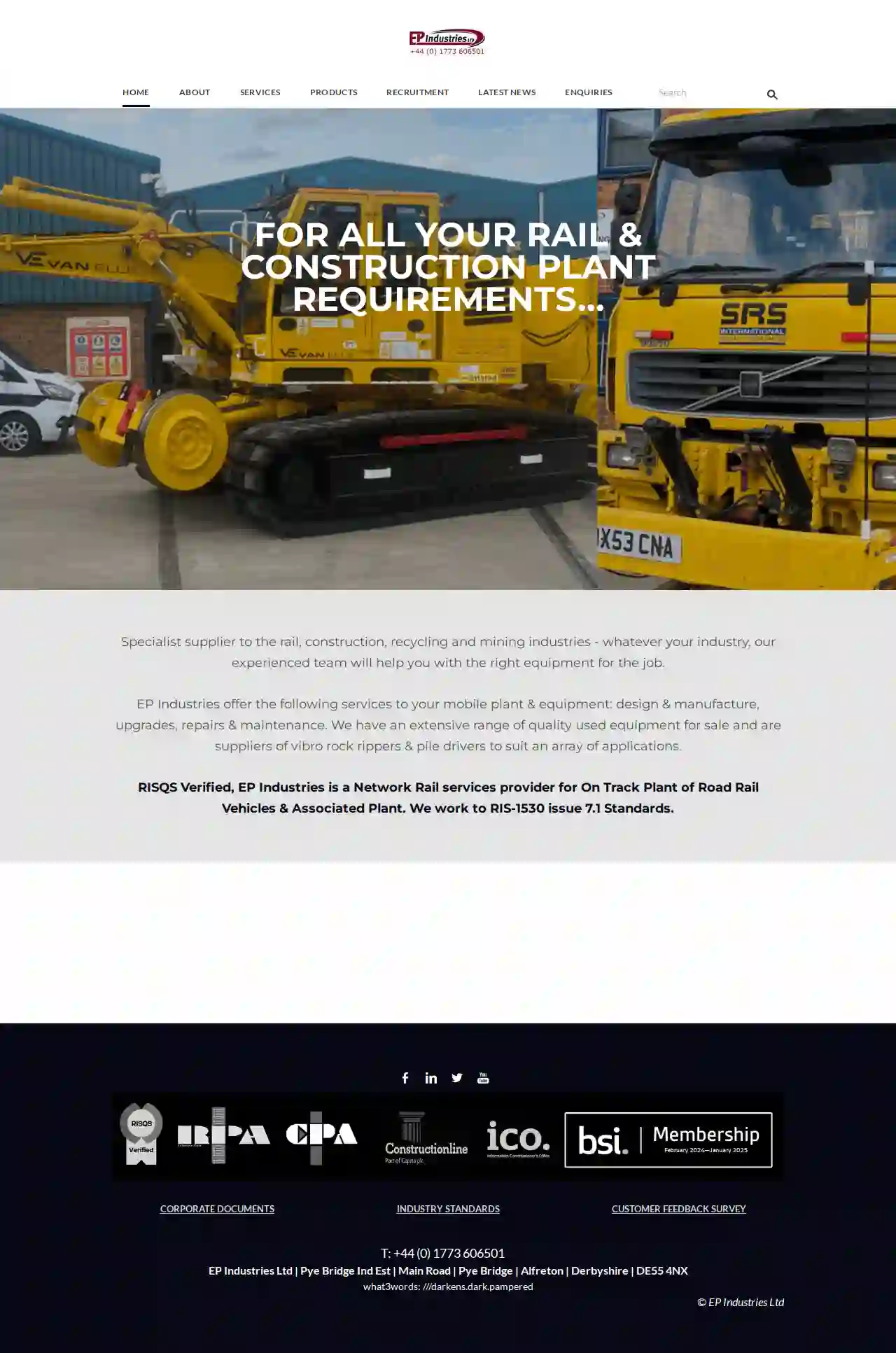
E P Industries Ltd
3.29 reviewsPye Bridge Ind Est, Main Road, Pye Bridge Ind Est | Main Road | Pye Bridge, Alfreton, DE55 4NX, GBEP Industries: Your Trusted Partner for Rail & Construction Plant EP Industries is a leading provider of services and products to the rail, construction, recycling, and mining industries. Established in 1988 by Eddie Pilsworth, we've built a strong reputation for quality workmanship, personalized service, and quick response times. Our dedicated team has years of experience maintaining mobile plant, from single machines to large fleet operations, ensuring we can meet your needs, both nationally and internationally. Our expertise extends beyond traditional services. We've gained valuable experience operating mobile equipment in open pit, coal mining, quarrying, and other extractive industries, allowing us to offer a unique perspective and tailored solutions to mobile plant users. At EP Industries, we prioritize building long-term relationships with our customers, ensuring our services are always aligned with your specific requirements.
- Services
- Why Us?
- Gallery
Get Quote
Over 11,537+ Excavation Pros in our network
Our excavation pros operate in West Bridgford & surrounding areas!
ExcavationHQ has curated and vetted the Best Excavation Businesses in and around West Bridgford. Find a reliable contractor today.
Frequently Asked Questions About Demolition Contractors
- Dust Suppression: Use water spraying, misting systems, or other dust suppression techniques to control airborne particles.
- Noise Barriers: Erect temporary noise barriers around the demolition site to reduce noise transmission to nearby properties.
- Work Schedule: Schedule noisy demolition activities during permitted hours to minimize disturbance to neighbors.
- Communication: Keep neighbors informed about the demolition schedule and any potential disruptions.
- Implosion: Using explosives to collapse a structure inwards rapidly. Suitable for large buildings in open areas.
- Wrecking Ball: Swinging a large steel ball to impact and break down the structure. Effective for bringing down walls and other solid elements.
- High-Reach Demolition: Utilizing specialized excavators with extended arms and demolition attachments for dismantling tall structures piece by piece.
- Selective Demolition: Removing specific parts of a building while preserving other sections. Often used in renovation projects.
- Deconstruction: Carefully dismantling a building to salvage reusable materials, reducing waste and environmental impact.
- Feasibility Studies: Assessing the viability and challenges of a demolition project.
- Demolition Planning: Developing demolition plans, including method selection, sequencing, and safety procedures.
- Permitting Assistance: Navigating the demolition permitting process and ensuring compliance with regulations.
- Hazardous Material Surveys: Identifying and managing hazardous materials, such as asbestos and lead paint.
- Cost Estimating: Providing accurate cost estimates for demolition services.
- Project Management: Overseeing the demolition process and ensuring it proceeds as planned.
- 'Can I see proof of your licensing and insurance?' Verify their credentials and coverage.
- 'What experience do you have with projects like mine?' Ensure they have relevant expertise.
- 'Can you provide references from past clients?' Check their reputation and customer satisfaction.
- 'What are your safety protocols?' Prioritize contractors who emphasize safety.
- 'How will you handle hazardous materials?' Ensure they have proper procedures for asbestos or lead abatement.
- 'What is your timeline for completing the project?' Understand the project duration.
- 'How will you manage noise, dust, and debris?' Discuss mitigation measures for minimizing disruption.
- 'What are your payment terms?' Clarify payment schedules and any required deposits.
How can I minimize the dust and noise from demolition?
What are the different types of demolition?
What is the role of a demolition consultant?
What questions should I ask a demolition contractor before hiring them?
How can I minimize the dust and noise from demolition?
- Dust Suppression: Use water spraying, misting systems, or other dust suppression techniques to control airborne particles.
- Noise Barriers: Erect temporary noise barriers around the demolition site to reduce noise transmission to nearby properties.
- Work Schedule: Schedule noisy demolition activities during permitted hours to minimize disturbance to neighbors.
- Communication: Keep neighbors informed about the demolition schedule and any potential disruptions.
What are the different types of demolition?
- Implosion: Using explosives to collapse a structure inwards rapidly. Suitable for large buildings in open areas.
- Wrecking Ball: Swinging a large steel ball to impact and break down the structure. Effective for bringing down walls and other solid elements.
- High-Reach Demolition: Utilizing specialized excavators with extended arms and demolition attachments for dismantling tall structures piece by piece.
- Selective Demolition: Removing specific parts of a building while preserving other sections. Often used in renovation projects.
- Deconstruction: Carefully dismantling a building to salvage reusable materials, reducing waste and environmental impact.
What is the role of a demolition consultant?
- Feasibility Studies: Assessing the viability and challenges of a demolition project.
- Demolition Planning: Developing demolition plans, including method selection, sequencing, and safety procedures.
- Permitting Assistance: Navigating the demolition permitting process and ensuring compliance with regulations.
- Hazardous Material Surveys: Identifying and managing hazardous materials, such as asbestos and lead paint.
- Cost Estimating: Providing accurate cost estimates for demolition services.
- Project Management: Overseeing the demolition process and ensuring it proceeds as planned.
What questions should I ask a demolition contractor before hiring them?
- 'Can I see proof of your licensing and insurance?' Verify their credentials and coverage.
- 'What experience do you have with projects like mine?' Ensure they have relevant expertise.
- 'Can you provide references from past clients?' Check their reputation and customer satisfaction.
- 'What are your safety protocols?' Prioritize contractors who emphasize safety.
- 'How will you handle hazardous materials?' Ensure they have proper procedures for asbestos or lead abatement.
- 'What is your timeline for completing the project?' Understand the project duration.
- 'How will you manage noise, dust, and debris?' Discuss mitigation measures for minimizing disruption.
- 'What are your payment terms?' Clarify payment schedules and any required deposits.